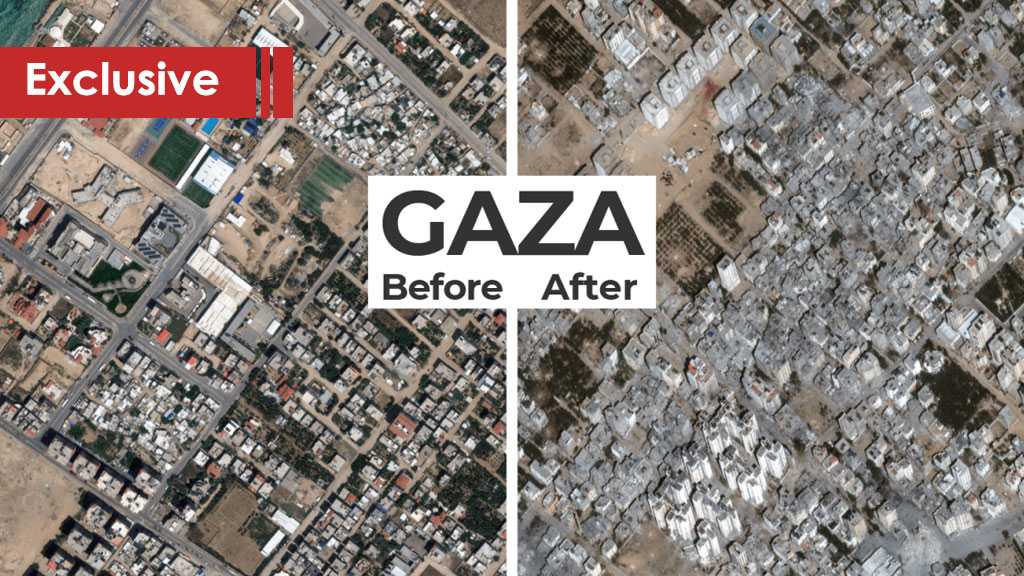
The War in Gaza Accelerates “Israel’s” Destruction

By Mohamad Hammoud
Lebanon – Once regarded as an undefeated military force, “Israel” now finds itself increasingly reliant on the United States for protection, as the cracks in its foundational structure begin to widen. This shift in dynamics is indicative of the multifaceted challenges the nation faces, both externally and internally. However, a more insidious threat is emerging within its borders, jeopardizing its very existence.
In recent weeks, several prominent figures, including former “Israeli” Prime Minister and military officials, have articulated their concerns regarding the impact of the war in Gaza on the fabric of “Israeli” society. Their analyses highlight the strategic, political and social challenges that “Israel” currently confronts. The protracted nature of the conflict has not only strained military resources but has also exacerbated divisions within “Israeli” society. The ongoing violence and political instability have led to a growing sense of disillusionment among “Israelis”, raising questions about “national” unity and identity.
Ehud Olmert’s Analysis of “Israel’s” Internal Dangers
In his August 2024 article published in “Haaretz”, former Prime Minister Ehud Olmert articulates a grave warning regarding the internal threats confronting “Israel”. He asserts, “The biggest danger facing ‘Israel’, the one truly threatening the ‘state’s’ existence, is the danger from within, which most of us are not attending to.” Drawing from his experiences during the 2006 Hezbollah conflict, Olmert presents a compelling argument that internal strife is eroding the political and social cohesion of the nation. He specifically highlights how the current government's management of the Gaza conflict has intensified these societal fractures.
Olmert provocatively questions whether “Israel” stands on the precipice of civil war, asserting that the most significant threat arises not from Hamas or Hezbollah, but from the radicalization of certain factions within “Israeli” society. He observes that extremist elements have gained momentum, emboldened by their connections to government officials. This unprecedented support, he argues, has enabled these groups to challenge the “Israel” Occupation Forces [IOF] and other state institutions. He cites instances of violence, such as assaults on military bases, as inevitable outcomes of the power these groups have amassed, coupled with a perceived mandate to act according to their own ideologies. Such extremist factions have been known to discriminate against, and even physically assault, those who oppose them.
Moreover, Olmert sheds light on the strain the ongoing conflict has imposed on “Israel’s” military. He notes that some IOF units are operating outside the established military chain of command, further undermining the entity’s defensive capabilities. The psychological toll of the conflict, particularly on soldiers and non-combatants living in a state of perpetual fear, compounds these challenges. As more “Israelis” face displacement and live under the constant threat of rocket attacks, the societal bonds that once unified the nation are increasingly fraying. The former Prime Minister warns that these acts are symptomatic of a broader trend that threatens the very foundation of the “Israeli” “state”, with the potential of “civil” war and internal collapse if left unaddressed.
Maj. Gen. Yitzhak Brik’s Analysis of “Israel’s” Internal Dangers
Echoing the same sentiment but from the lances of a military leader, in his article titled "It Is Not Hamas That Is Collapsing, but ‘Israel’", Maj. Gen. Yitzhak Brik argues that “Israel” is facing deep, existential challenges as a result of its military operations in Gaza. According to Brik, instead of weakening Hamas as expected, the ongoing war is weakening “Israel” from within, causing both military and societal strain.
Brik stresses that the IOF is growing weaker as the conflict drags on. “Israeli” reservists, tired of being redrafted repeatedly, are increasingly reluctant to serve. The regular conscripted soldiers are becoming exhausted and are unable to complete critical training due to the prolonged deployment. This decline in both morale and readiness presents a long-term threat to “Israel’s” ability to defend itself in future conflicts.
The Maj. Gen. describes the ongoing conflict as a war of attrition, not just against Hamas in Gaza, but also against Hezbollah in the north. This double-front conflict is draining “Israel’s” military and economic resources, as well as harming its international relations. He highlights the tactical failures of the war, stating that despite “Israel’s” efforts, the number of Hamas tunnels destroyed in Gaza represents only a small fraction of the total network.
The article also addresses the heavy toll the war is taking on “Israel’s” economy and social cohesion. As the conflict continues, the entity’s social fabric becomes more strained, with divisions growing over the prolonged military engagement. This internal fracturing, combined with the economic hit from the war, is weakening “Israel” as a “nation”.
Brik calls for a strategic reassessment and an immediate halt to the military campaign in Gaza. He suggests that stopping the fighting in Gaza could lead to a broader cessation of hostilities, including with Hezbollah in the north. In his view, the ongoing military engagement is not only ineffective but is actively contributing to Israel's decline.
In conclusion, the war in Gaza irrevocably altered the landscape of “Israel”, revealing fissures that had long lain hidden beneath the surface. This conflict not only illuminated the fractures in “Israel’s” foundational strength but also underscored an alarming dependence on American support for its security. The stark reality unveiled by the war suggests that if “Israel” struggles to safeguard its “sovereignty” in the absence of US assistance, it stands ill-equipped to defend its allies throughout the Middle East.
Comments



